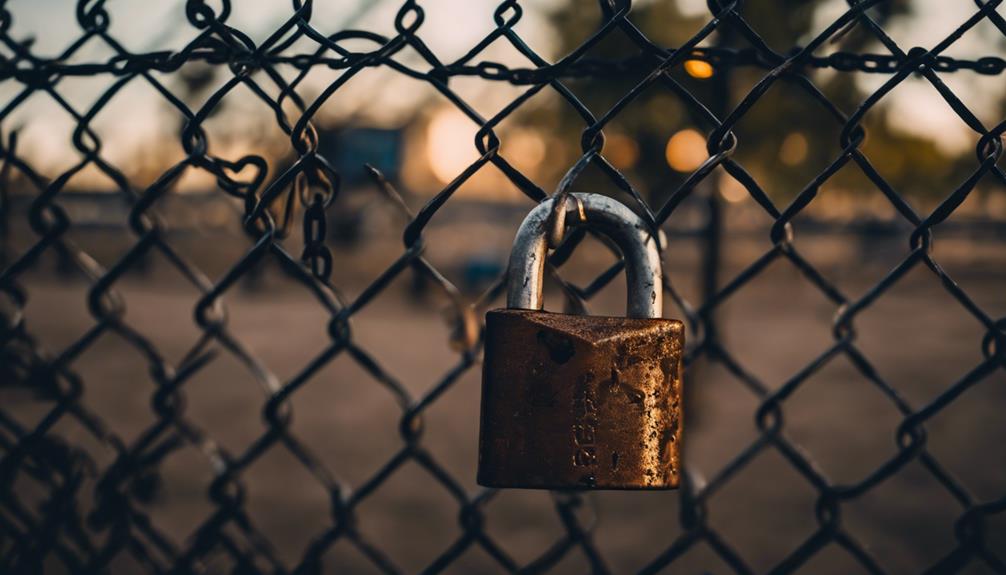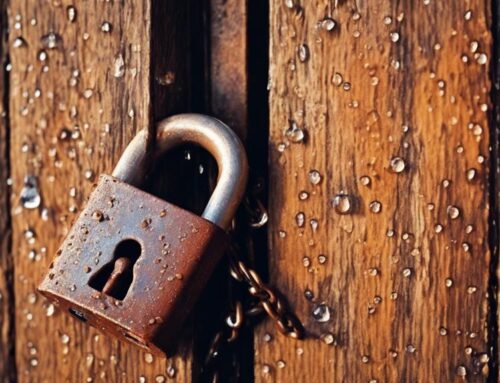A loose lock can greatly compromise your security by making it easy for intruders to gain unauthorized access. Just a slight movement or wobble can leave your door vulnerable, giving offenders a chance to break in without difficulty. You might notice signs like difficulty turning the key or visible gaps between the door and frame, indicating urgency for repair. Regular checks and maintenance help prevent these issues, so don't ignore a loose lock. Staying proactive is essential for your safety, and there's much more you can do to guarantee your home remains secure.
Key Takeaways
- Loose locks create vulnerabilities, allowing unauthorized entry and significantly increasing the risk of theft.
- Regular checks for wobbling or difficulty in turning keys are essential to maintain lock security.
- Misalignment caused by temperature fluctuations or wear can compromise how effectively a lock engages.
- Ignoring signs of loose locks can lead to a false sense of security and increased property risk.
- Proactive maintenance and timely repairs are vital to ensure the safety of your home and loved ones.
Understanding Loose Locks
Understanding loose locks is essential for maintaining your home's security. When a lock becomes loose, it creates significant lock security risks that can jeopardize your safety and the safety of those you serve. A loose lock may not engage properly, leaving doors vulnerable to unauthorized entry.
Additionally, signs your lock needs replacement soon can often accompany a loose lock, making it vital to pay attention to these indicators. You mightn't realize that even the smallest movement in a lock can lead to a security compromised lock, making your home an easy target for intruders.
It's important to regularly check the stability of your locks. If you notice any wobbling or difficulty in turning the key, it's time to address the issue. Ignoring a loose lock can lead to more extensive problems down the road, not only risking your property but also putting loved ones at risk.
Common Causes of Loose Locks
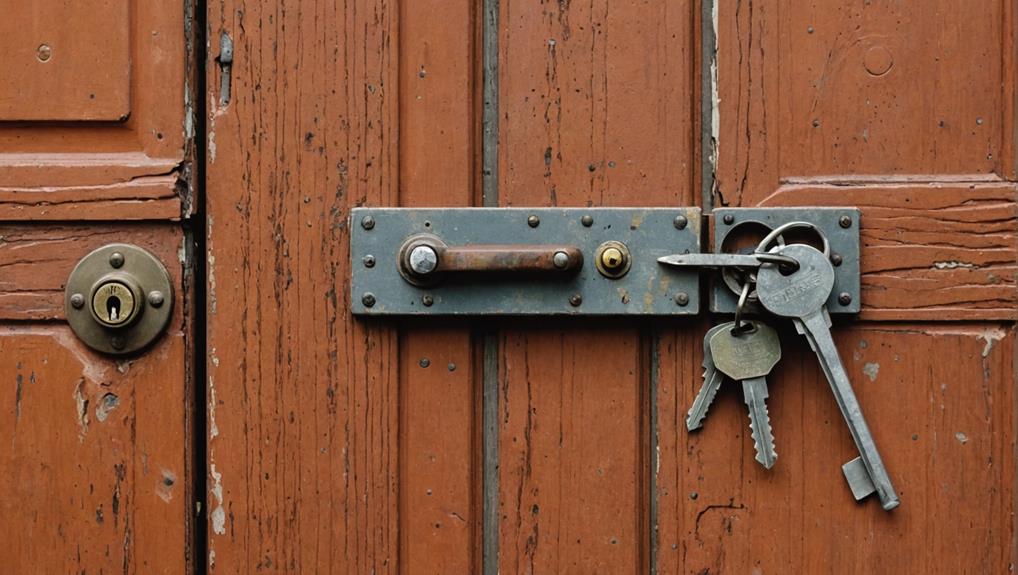
Loose locks can stem from various issues, each contributing to the overall security of your home. One common cause is wear and tear. Over time, frequent use can loosen screws or fittings, leading to loose locks.
Additionally, mastering sticking locks is essential because these issues can escalate if not addressed promptly. Another factor is temperature fluctuations. Changes in humidity and temperature can cause materials to expand and contract, resulting in misalignment and looseness.
Improper installation is also a significant contributor. If a lock isn't correctly fitted, it can become loose quickly. Additionally, if you notice that your lock is hard to turn or feels wobbly, it's vital to address this right away. Ignoring these loose lock dangers could jeopardize your home's security.
Regular lock tightening can help maintain the integrity of your locks, ensuring they function properly. If you find that tightening isn't enough, it may be time for replacing loose locks altogether.
Security Risks of Loose Locks
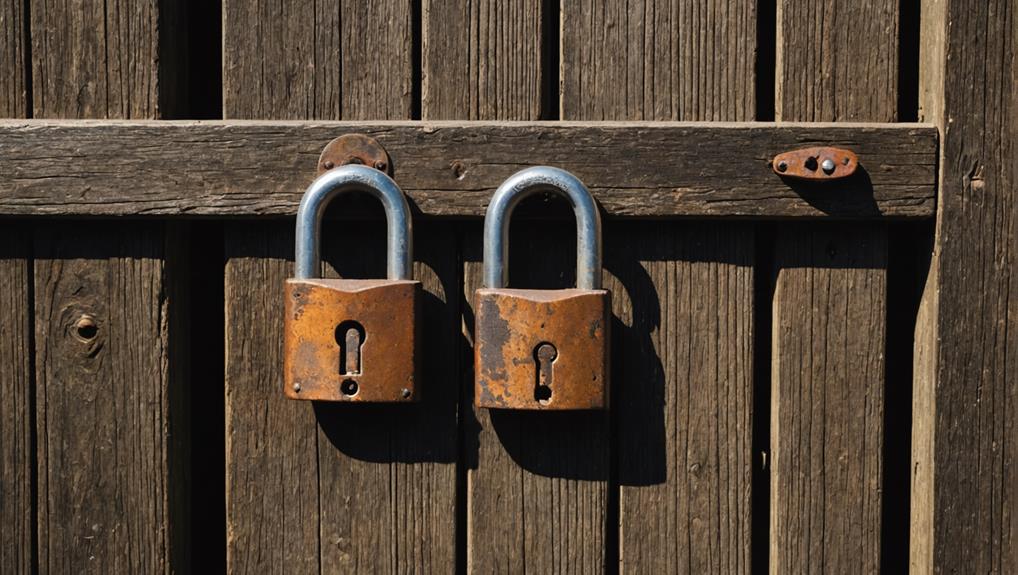
Neglecting loose locks poses significant security risks that can compromise your home. When you have a loose door lock, it often means your lock isn't secure, providing an easy entry point for unwanted visitors. This vulnerability can lead to theft, property damage, or even personal harm.
Additionally, understanding the differences between re-keying versus lock replacement can help you make an informed decision about securing your property. You wouldn't want to put yourself or your loved ones in danger, so addressing this issue is vital.
Moreover, a loose lock can give you a false sense of security. You might believe your home is safe, but if the lock is compromised, it's only a matter of time before someone takes advantage of the situation.
The urgency for lock replacement becomes clear when you consider the potential consequences of inaction.
Signs Your Lock Is Loose
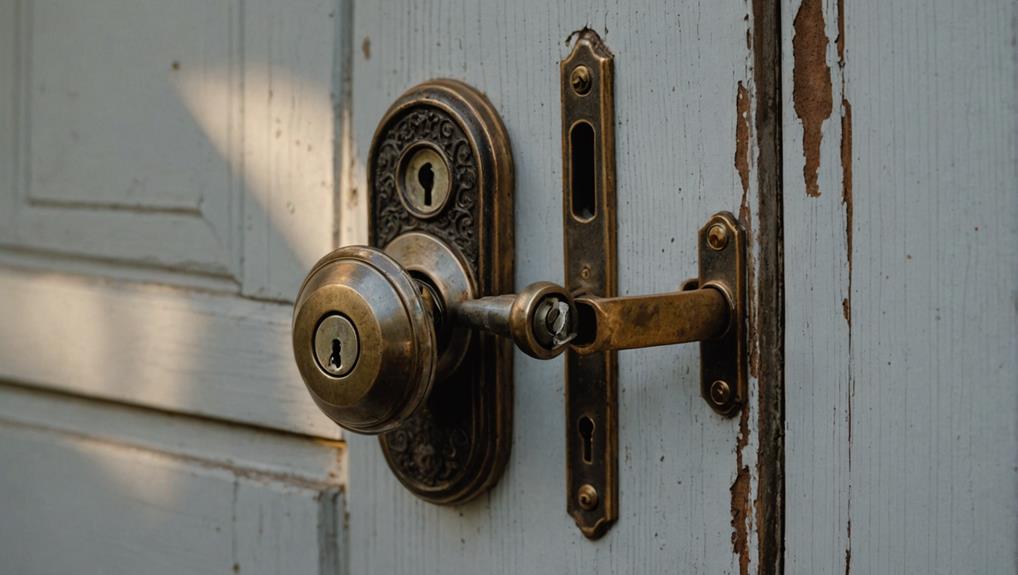
If you notice your lock has a visible wobble when you jiggle it, that's a clear sign it's loose.
A loose lock can lead to security vulnerabilities, making it easier for intruders to gain access to your home. You might also struggle to turn the key smoothly, which can indicate alignment issues.
Visible Wobbling Movement
A wobbly lock can signal potential security issues that shouldn't be ignored. If you notice visible wobbling when you turn your key or jiggle the lock, it's crucial to take action. This movement can indicate that the lock isn't properly secured, making it easier for intruders to exploit.
By being vigilant, you're not just protecting your property but also serving your community by discouraging crime.
Here are some signs to look for that indicate your lock might be loose:
- Excessive play: You feel movement when you twist the key.
- Misalignment: The lock doesn't sit flush with the door frame.
- Gap between the lock and door: You can see light shining through.
- Noise when turning: You hear rattling or grinding sounds.
- Difficulty closing: The lock doesn't engage smoothly or fully.
If you identify any of these signs, it's vital to address the issue promptly.
Consider tightening the screws or consulting a professional locksmith. By doing so, you not only enhance your safety but also contribute to a more secure environment for everyone around you.
Difficulty Turning Key
Noticing difficulty turning your key can be another warning sign that your lock is loose. This issue can not only be frustrating but may also indicate a potential security risk. A stiff or unresponsive lock can lead to wear and tear, ultimately compromising the safety of your home or business.
Here's a simple table to help you identify the signs of a loose lock:
| Sign | What to Look For | Action Needed |
|---|---|---|
| Difficulty Turning Key | Key feels stuck or requires extra force | Check lock tightness and screws |
| Key Doesn't Fully Insert | Key won't go in smoothly | Inspect for debris or misalignment |
| Jiggling Key | Key wobbles when turned | Tighten screws and check fit |
| Lock Doesn't Engage | Bolt doesn't extend fully | Replace or repair the lock |
If you're experiencing any of these signs, it's essential to take action. Tightening screws or realigning the lock can often resolve the issue. By addressing these problems early, you can enhance your security and guarantee peace of mind for yourself and those you serve.
Misalignment With Doorframe
Often, you'll notice that your lock misaligns with the doorframe, which can be a clear indicator of a loose lock. This misalignment not only affects your ability to secure the door but also poses a risk to your safety and the safety of those you care about.
If you see any of the following signs, it's time to take action:
- Visible gaps between the door and the frame
- Difficulty closing the door without force
- Unusual noise when locking or opening
- Worn or damaged hinges
- Inconsistent latch engagement, where the latch doesn't catch properly
Recognizing these signs early helps you address the issue before it escalates. A loose lock can lead to bigger problems, such as forced entry, putting your loved ones and possessions at risk.
By staying vigilant and maintaining your locks, you're not just ensuring your own safety; you're also contributing to the well-being of your community.
If you identify any of these warning signs, don't hesitate to consult a professional locksmith or make the necessary repairs yourself. Your commitment to security can make a world of difference.
Assessing Your Lock's Stability
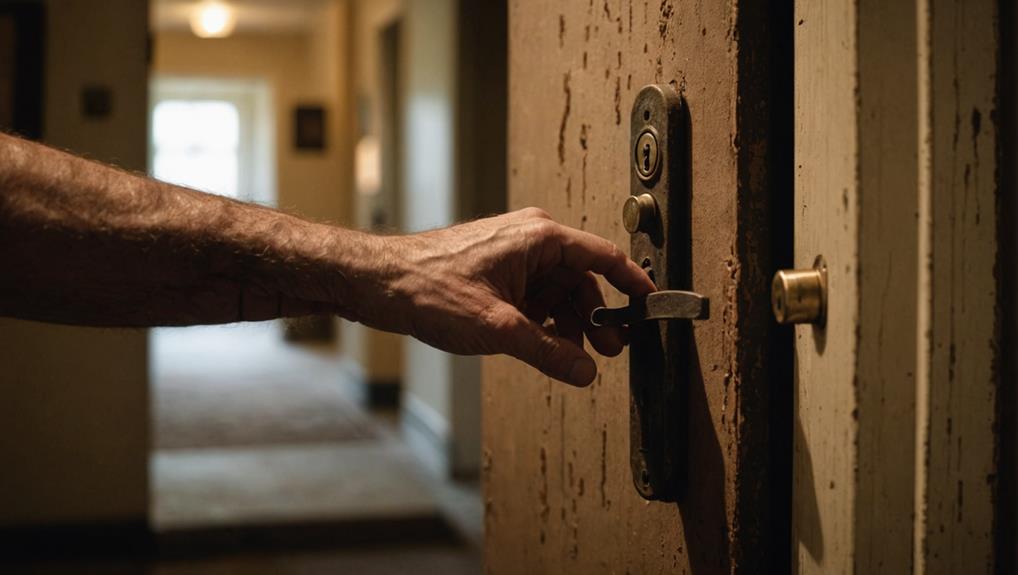
To keep your home secure, you need to regularly assess your lock's stability.
Look for signs of a loose lock, like difficulty turning the key or wobbling when you pull on it.
Rust can greatly weaken locks, making them more susceptible to failure, and in some cases, when to replace rusty locks is essential for maintaining security.
Maintaining your locks can prevent bigger issues down the road and guarantee your safety.
Signs of a Loose Lock
A loose lock can compromise your security, making it essential to identify any signs of instability.
Regularly checking your locks guarantees they function properly and keep your home safe. Here are some indicators that your lock may be loose:
- Wobbling: If your lock moves around when you turn the key, it's a clear sign of looseness.
- Difficulty Turning: Struggling to turn the key can indicate a misaligned or loose lock.
- Visible Gaps: Check for any gaps between the lock and the doorframe; this suggests it may not be securely fastened.
- Noisy Operation: A lock that rattles or makes unusual sounds when you use it's likely not stable.
- Inconsistent Engagement: If the latch doesn't fully engage or retract consistently, it could mean the lock is loose.
Importance of Regular Maintenance
Regular maintenance of your locks is essential for ensuring their stability and effectiveness. When you take the time to assess your locks regularly, you can catch any issues before they escalate into significant security threats. Check for any looseness, rust, or wear and tear. A simple tightening of screws or lubrication can make a world of difference.
By routinely inspecting your locks, you not only protect your belongings but also serve those who depend on you. Whether it's family, friends, or clients, ensuring their safety reflects your commitment to their well-being. If you notice any signs of wear, don't hesitate to replace or repair the lock.
Additionally, consider scheduling professional maintenance at least once a year. This proactive approach helps you stay ahead of potential problems and provides peace of mind. Remember, a well-maintained lock is your first line of defense against intruders.
Investing a little time and effort in lock maintenance ultimately enhances the security of your environment. By prioritizing this aspect of safety, you're not just protecting yourself; you're creating a secure space for everyone around you.
Tools Needed for Repairs
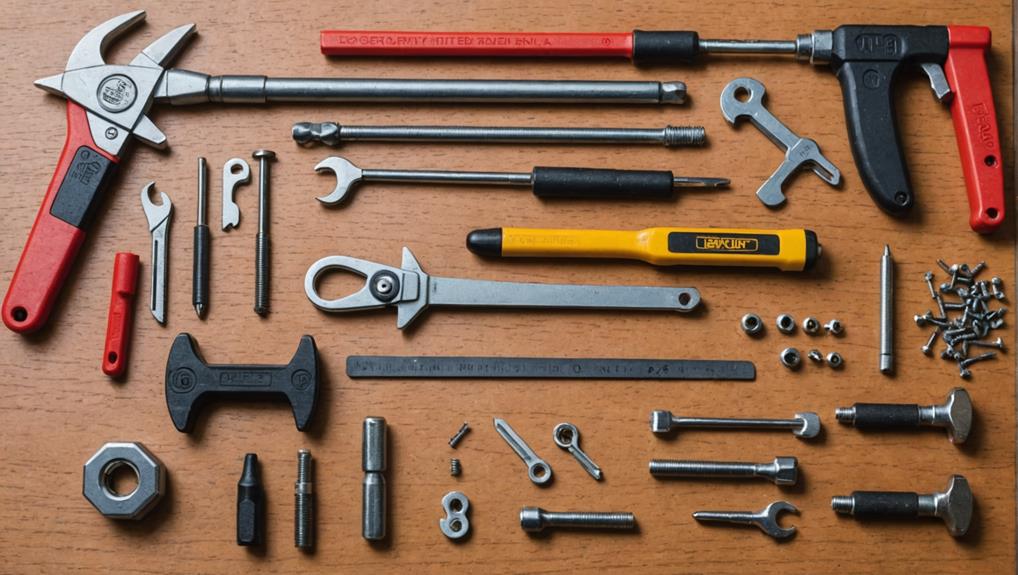
When tackling loose locks, having the right tools on hand makes all the difference in achieving a secure fix.
Using the correct tools not only guarantees that the job is done right but also minimizes the risk of damaging the lock or door. Choosing the right tools can enhance your repair experience.
Safeguarding the safety of your loved ones and community starts with being prepared. Here's a list of essential tools you'll need:
- Screwdriver Set: A variety of screwdrivers, including Phillips and flathead, helps you tackle different types of screws.
- Pliers: Useful for gripping and twisting, pliers can help you adjust any stubborn parts.
- Measuring Tape: Accurate measurements guarantee you get the right fit for any repairs or replacements.
- Lubricant: A good lock lubricant can enhance the functionality of your locks, preventing wear and tear.
- Replacement Parts: Having spare screws or lock components on hand means you're ready for any unforeseen issues.
With these tools, you'll be well-equipped to address loose locks efficiently.
By taking the time to make these repairs, you're not just securing your property; you're fostering a sense of safety and trust within your community.
Step-by-Step Repair Guide
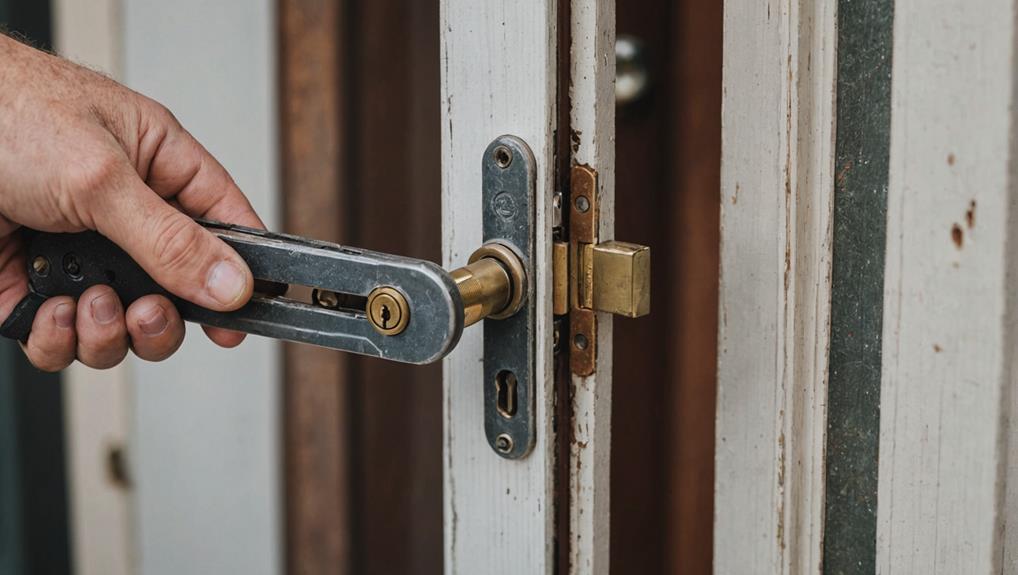
Having the right tools sets you up for success as you tackle loose locks. First, gather your tools: a screwdriver, a wrench, and some lubricant. Lock re-keying can also be a helpful step to take into account if you find that your loose lock has been compromised to enhance your security.
Start by inspecting the lock. If you see screws, tighten them using your screwdriver. Verify you're turning them clockwise to secure the lock properly.
Next, if the lock is still loose, check the strike plate on the door frame. Sometimes, it just needs a little adjustment. Loosen the screws holding it in place, reposition it so it aligns perfectly with the lock, and then tighten those screws back.
If the lock feels stiff, apply a few drops of lubricant to guarantee smooth operation. This helps prevent further wear and tear. After lubricating, test the lock multiple times to confirm it functions properly.
Lastly, don't forget to check the door itself. Verify it's hung correctly and not causing undue pressure on the lock. A well-hung door can greatly improve lock performance.
When to Call a Professional
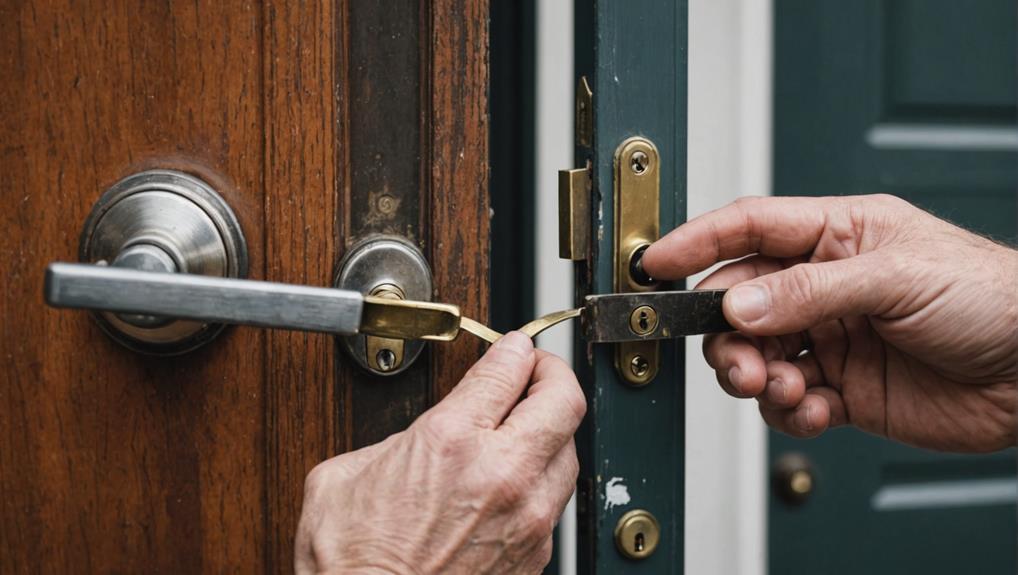
Recognizing the limits of your DIY skills is vital for effective home maintenance. While tackling minor repairs can be satisfying, some situations call for professional help to guarantee safety and security.
A loose lock can lead to further issues if not addressed promptly, and exploring the scenarios where hiring a professional locksmith is the best choice is significant. If you notice any of the following signs, it's time to reach out to a locksmith:
- The lock is severely damaged or rusted.
- The key won't turn, indicating internal issues.
- You've lost your keys or had them stolen.
- You're experiencing repeated lockouts.
- You're unsure about the security level of your current locks.
Preventive Measures for Lock Security
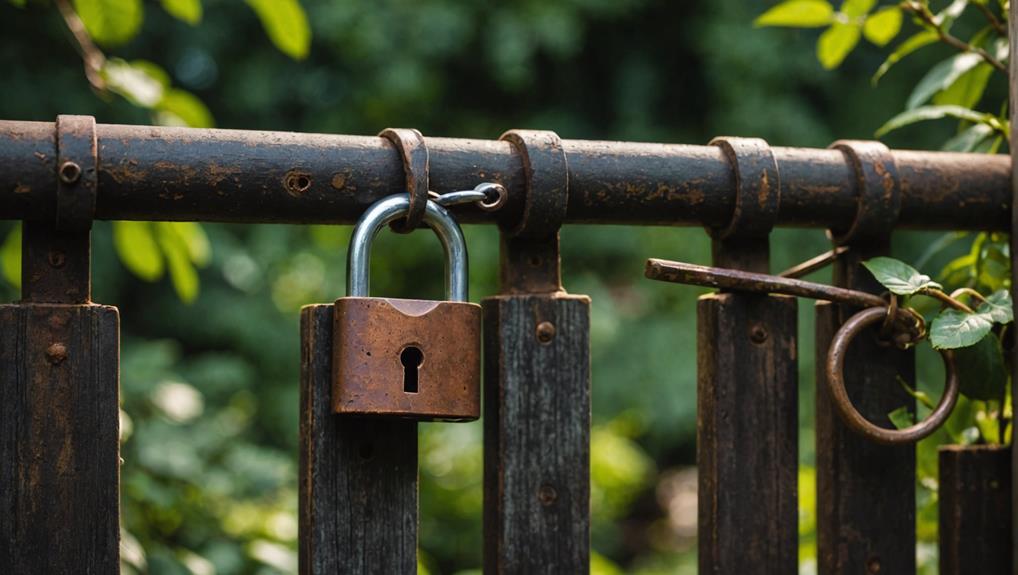
Securing your locks is essential for maintaining a safe home environment. You can take several preventive measures to protect your space and the people you care about.
First, regularly inspect your locks for signs of wear or damage. If you notice any issues, address them immediately to prevent security breaches. Upgrading to more robust locks is a key aspect of prioritizing security; consider enhanced protection options like deadbolts or smart locks.
Next, consider upgrading to high-quality locks, such as deadbolts or smart locks, which offer enhanced protection. Installing these types provides peace of mind and serves your loved ones by creating a safer atmosphere.
Additionally, make it a habit to change your locks when you move into a new home or after a roommate leaves. You never know who might still have a key, and this simple step protects those living with you.
Don't forget about routine maintenance, too. Lubricate your locks periodically to guarantee they function smoothly, reducing the risk of them becoming loose over time.
Frequently Asked Questions
Can Loose Locks Be Fixed Without Professional Help?
Yes, you can fix loose locks without professional help!
First, gather a few tools like a screwdriver and some lubricant. Check the screws on the lock; if they're loose, tighten them gently.
If the lock is sticking, apply a bit of lubricant to ease movement.
If the problem persists, consider replacing the lock yourself.
Just remember to be patient and follow instructions carefully, and you'll have a secure lock in no time!
What Types of Locks Are Most Prone to Becoming Loose?
Locks that lack longevity often loosen over time.
You'll find that traditional tumbler locks, particularly those made of cheaper materials, are most prone to becoming loose.
Deadbolts can also develop issues, especially if they're improperly installed.
If you're serving others, consider recommending stronger, sturdier options like smart locks or high-security deadbolts.
These not only enhance safety but also reduce the risk of future looseness, keeping everyone's peace of mind intact.
How Often Should I Check My Locks for Stability?
You should check your locks for stability at least once every few months.
Regular inspections help you catch any issues before they become bigger problems. When you're checking, give each lock a gentle wiggle to see if it feels loose. If it does, tighten it or consider replacing it.
Keeping your locks secure not only protects your belongings but also guarantees peace of mind for you and those you care about.
Are Loose Locks Covered by Homeowner's Insurance?
Imagine you come home from a long day, only to find your front door lock isn't functioning properly.
You might wonder if a loose lock is covered by your homeowner's insurance. Typically, insurance policies don't cover damages from maintenance neglect, so it's essential to regularly check your locks.
If a break-in occurs due to a loose lock, you may not receive compensation. Always prioritize security to protect your loved ones and belongings.
Can Weather Affect the Stability of My Locks?
Yes, weather can definitely affect the stability of your locks.
Extreme temperatures can cause metal to expand or contract, leading to misalignment. Rain and humidity can introduce rust, which may hinder the lock's functionality.
If you live in an area with harsh weather conditions, it's important to regularly check and maintain your locks.
Conclusion
In the hustle of daily life, you might not think twice about a loose lock—until you come home to an unexpected surprise. Don't let a simple oversight compromise your security. By regularly checking and maintaining your locks, you can prevent potential break-ins and keep your peace of mind intact. Remember, it's often the little things that matter most. So, take a moment to assess your locks today; you never know what might be waiting for you tomorrow.

